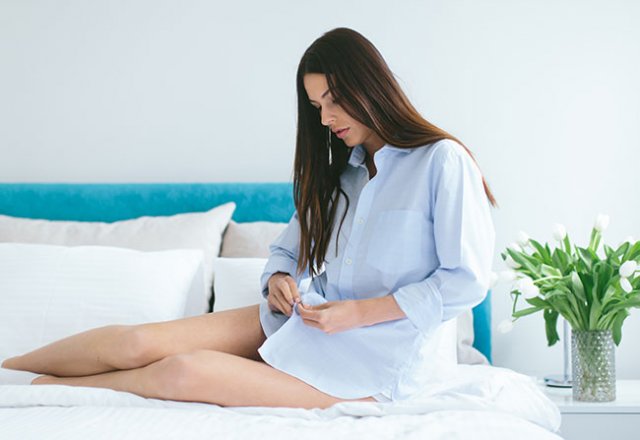
How to understand your natural cycles and ageing

Your first step is knowing what’s normal and what to expect.
For many women, the topic of hormones, periods and menopause is a no-go zone. NAT KRINGOUDIS explains why understanding our body’s natural cycles can shed light on the ageing process and help us to feel empowered.
If there’s one thing I’m sure of, it’s that us ladies don’t have too much of an understanding around hormones and ageing. Is it because we are in denial, happily avoiding the inevitable, or because nobody is talking about it? No matter what the case, I think it’s imperative that we understand our body’s rhythms and cycles in order to wholly prepare for – and even appreciate – the inevitable natural process.
THE EIGHT-YEAR CYCLES
Our bodies are cyclic and Chinese medicine beautifully summarises the cycles for women that come around every eight years or so.
FROM EIGHT YEARS OF AGE:
We commence puberty. Young girls begin to show breast buds, there may be changes with cervical fluid as they prepare for the arrival of the period. This doesn’t mean the period arrives at the age of eight, as it tends to show up between 11 to 14 years of age, on average.
FROM 16 YEARS OF AGE:
The menstrual cycle is establishing itself (yes, it’s normal for it to be irregular right up until a woman is 18 to 20 years old), we go through a period of more hormonal changes marked by weight gain (all normal) and possibly some pretty impressive emotions to match. The good news is it’s just a phase.
FROM 24 YEARS OF AGE:
We hit the prime of our fertility. We’re baby ready, our cycles are regular and, generally, we feel good. Although modern lifestyle may encroach, things are mostly dandy.
FROM 32 YEARS OF AGE:
Okay, here is where you do not shoot the messenger. At this age, we are still very fertile and generally we have a better understanding of our hormones and cycles. From our mid-30s, our hormones begin to change (again) and we hit peri-menopause.
WHAT HAPPENS NOW?
Contrary to what we might think, peri-menopause is not a huge block of nothingness. Perhaps we don’t notice because we’re too busy with careers, babies, soccer practice and getting that last mouthful of broccoli into our children’s mouths. Life keeps on going and so do our cycles. Understanding this may just be the key to your sanity over the next little – or long – while.
As our hormones begin to fall, we may begin to notice signs of ageing, but we’re damn good at trying to superficially prevent it. But if we can begin to understand our internal workings a little better, we can indeed begin to slow down the biological clock, gently support ageing and stop fearing the worst.
FROM OUR MID-30s:
Our periods are still regular but you might notice that the length of your period begins to change. You’ll begin to see shorter periods (hallelujah!), perhaps three days instead of five or six. This is very normal. You might notice also an increase of breast tenderness, an increase of emotions, PMS and mood swings, fluid retention and weight gain. The problem is these symptoms can be accepted as a result of being overworked and tired.
FROM OUR 40s:
You might notice your bleeding begins to get heavier, you might be experiencing flooding and increased pain. There might even be the odd cycle missed. The most noticeable thing is night sweats, which are typically worse pre-period. Again, these are all normal signs, although they can be attended to with a little TLC too.
From around 48 years of age, our periods may become a little all over the place. You might find you get caught out without a tampon because your cycles could be long or short or whatever they darn decide. The sweats may increase, your brain may feel a little foggy and you may even see other niggly issues such as recurrent UTIs [urinary tract infections] or candida. You’ll still see that your symptoms are in line with your cycles, that your sweats are still worse before your period as you’re not yet at a point where they are ‘hot flushes’.
FROM OUR MID 50s:
We see things shaken up a little. The cycles are sporadic and become less frequent, the hot flushes are definitely in full swing at anytime of the cycle. Oestrogen is on the down (finally!)
MENOPAUSE
Menopause becomes official when you have been without a period for one year. You might find yourself feeling like you have PMS with cramps to match but there is no sign of a period. Also, the hormones are changing (for the better!).
The good news is that the more you can have your body and your hormones in balance throughout every stage and age of your life, the better you will feel. The trick is all in leading your body towards this happy, homeostatic state each and every day from the time you begin menstruation and for every stage beyond. Your first step is knowing what’s normal and what to expect. If your symptoms start to vary, it’s the perfect time to start to look at exactly what your body is telling you.


